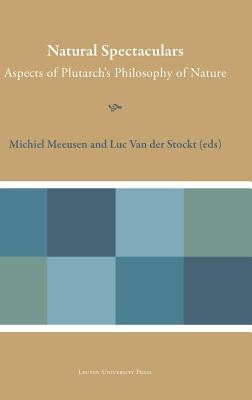
- Išsiųsime per 10–14 d.d.
- Leidėjas: Leuven University Press
- Metai: 2015
- ISBN-10: 9462700435
- ISBN-13: 9789462700437
- Formatas: 15.5 x 23.6 x 2 cm, kieti viršeliai
- Kalba: Anglų
- Extra -15 % nuolaida šiai knygai su kodu: ENG15
Natural Spectaculars + nemokamas atvežimas! | knygos.lt
Atsiliepimai
Aprašymas
As a philosopher and intellectual, Plutarch was very interested in the natural world around him, not only in terms of its elementary composition and physical processes but also with respect to its providential ordering and "wonders." His natural philosophical writings teach us much about his perception of physical reality and about his well-reflected attitude to the natural spectacle. He found his greatest inspiration in the ontological and epistemological framework of Plato's Timaeus, but many other philosophers and writers were also of seminal interest to his project. Clearly, the literary value of Plutarch's natural philosophical writings should not be underrated, nor should their rhetorical goals be discarded as futile.
Recently scholars have begun to reassess the ancient scientific value of Plutarch's natural philosophical writings. Natural Spectaculars aims to give further impetus to this project by treating several aspects of Plutarch's natural philosophy that have not been explored before.
Contributors: Paola Volpe Cacciatore (Università degli Studi di Salerno), Angelo Casanova (Università degli Studi di Firenze), Bram Demulder (KU Leuven), Ana Ferreira (Universidade do Porto), Israel Muñoz Gallarte (Universidad de Córdoba), Luisa Lesage Gárriga (Universidad de Málaga), Aurelio Pérez Jiménez (Universidad de Málaga), Lautaro Roig Lanzillotta (Rijksuniversiteit Groningen), Delfim Ferreira Leão (Universidade de Coimbra), Michiel Meeusen (KU Leuven), Jan Opsomer (KU Leuven), Aldo Setaioli (Università degli Studi di Perugia), Suzan Sierksma-Agteres (Rijksuniversiteit Groningen), Fabio Tanga (Università degli Studi di Salerno)
EXTRA 15 % nuolaida
Kupono kodas: ENG15
Akcija baigiasi už 3d.04:20:11
Nuolaidos kodas galioja perkant nuo 10 €. Nuolaidos nesumuojamos.

- Leidėjas: Leuven University Press
- Metai: 2015
- ISBN-10: 9462700435
- ISBN-13: 9789462700437
- Formatas: 15.5 x 23.6 x 2 cm, kieti viršeliai
- Kalba: Anglų
As a philosopher and intellectual, Plutarch was very interested in the natural world around him, not only in terms of its elementary composition and physical processes but also with respect to its providential ordering and "wonders." His natural philosophical writings teach us much about his perception of physical reality and about his well-reflected attitude to the natural spectacle. He found his greatest inspiration in the ontological and epistemological framework of Plato's Timaeus, but many other philosophers and writers were also of seminal interest to his project. Clearly, the literary value of Plutarch's natural philosophical writings should not be underrated, nor should their rhetorical goals be discarded as futile.
Recently scholars have begun to reassess the ancient scientific value of Plutarch's natural philosophical writings. Natural Spectaculars aims to give further impetus to this project by treating several aspects of Plutarch's natural philosophy that have not been explored before.
Contributors: Paola Volpe Cacciatore (Università degli Studi di Salerno), Angelo Casanova (Università degli Studi di Firenze), Bram Demulder (KU Leuven), Ana Ferreira (Universidade do Porto), Israel Muñoz Gallarte (Universidad de Córdoba), Luisa Lesage Gárriga (Universidad de Málaga), Aurelio Pérez Jiménez (Universidad de Málaga), Lautaro Roig Lanzillotta (Rijksuniversiteit Groningen), Delfim Ferreira Leão (Universidade de Coimbra), Michiel Meeusen (KU Leuven), Jan Opsomer (KU Leuven), Aldo Setaioli (Università degli Studi di Perugia), Suzan Sierksma-Agteres (Rijksuniversiteit Groningen), Fabio Tanga (Università degli Studi di Salerno)




Atsiliepimai